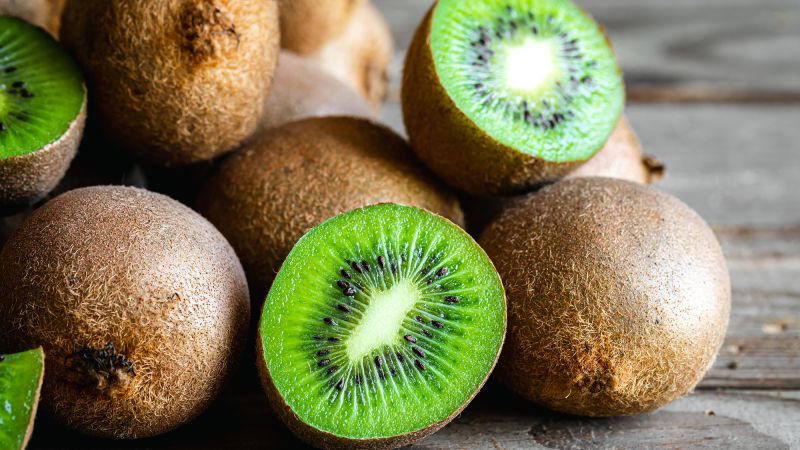
Eating 2 to 3 kiwis a day can relieve chronic constipation, according to new dietary guidelines
Do you often experience difficulty defecating? If the answer is yes, newly released recommendations may help relieve your symptoms.
Kiwifruit, rye bread and high mineral-content water can help alleviate chronic constipation, according to new dietary guidelines copublished October 13 by the Journal of Human Nutrition and Dietetics and Neurogastroenterology & Motility.
About 1 out of every 6 to 7 people are affected by chronic constipation worldwide. In the United States, 9% to 20% of adults have some form of chronic idiopathic constipation, in which the cause of the condition is unknown.
Some symptoms of chronic constipation include having a bowel movement fewer than three times a week, hard or lumpy stool, or straining or experiencing pain when pooping.
The guidelines “introduce foods and drinks (e.g., kiwifruit, prunes, rye bread, high mineral content water) and specific supplement interventions into clinical guidance, filling a long-standing gap between research and routine clinical advice,” lead study author Dr. Eirini Dimidi said in an email. “That will help clinicians give clearer, more targeted, and evidence-informed dietary advice, and will allow people to self-manage their symptoms more effectively.”
The guidance applies to healthy adults with chronic idiopathic constipation and “did not focus on constipation secondary to other conditions (e.g., neurological disease, pregnancy), so while some recommendations may be applicable, they should be used with caution in these groups, as well as in children,” said Dimidi, an associate professor in nutritional sciences at King’s College London.
The guidelines did not include a general recommendation for increased fiber intake in a patient’s diet. Rather, they focused on specific foods that could be beneficial, Dimidi added.
Certain lifestyle choices or situations, such as low fiber intake, dehydration, lack of exercise, or stress, can cause constipation. As a result, clinicians focus most treatment on dietary changes.
Previous dietary advice was broad, such as telling patients to eat more fiber. But these new guidelines, Dimidi said, suggest “incorporating evidence-based foods and drinks in your diet, such as consuming 2-3 kiwifruits a day.”
Unlike other recommended food such as prunes, kiwifruit is simple to incorporate into your diet.
“With kiwifruit, because it’s so well-tolerated, you usually can just step right into that dose, as opposed to prunes, for example, where you want to more gradually work up to that dose of six to eight prunes per day,” said Dr. William Chey, professor and chief of gastroenterology and hepatology at the University of Michigan. He was not involved in the new research.
Kiwis can increase stool bulk and water content, enhance protein digestion, and smoothen the movement of food, fluids and waste in the digestive tract. The small fruits also improve the amount of time it takes for waste to pass through your intestine and have natural prebiotic effects, such as improved digestion and reduced gut inflammation.
Kiwis are also palatable and soft, which makes them easy to eat, said Dr. Cuckoo Choudhary, the Dorrance H. Hamilton Professor of Medicine at Thomas Jefferson University Hospital in Philadelphia. She was not involved in the study.
You can also eat a kiwi’s skin or peel, which has extra fiber. But avoid heating a kiwi, since high temperatures destroy the enzyme that smoothens gut movement, Choudhary added.
Foods such as prunes, rye bread, flaxseeds, oranges, yogurt, beans and oatmeal can also help with chronic constipation.
For those who like dairy, you could “take a cup of yogurt, make it 8 ounces, any yogurt of your choice because all yogurts have probiotics, and take a heaped tablespoon full of crushed flaxseeds,” said Choudhary, an expert with the American Gastroenterological Association.
Other alternatives include dietary supplements, such as psyllium, which helps your intestine move stool along and reduces your body’s cholesterol absorption from food.
“That dosage is at least 10 grams of fiber per day. And again, the general rule is, start low and go slow. So start with 3 grams and gradually work your way up to 10 plus grams per day of psyllium to achieve the benefits,” said Chey, incoming president of the American College of Gastroenterology.
Physical activity is also an important lifestyle change that patients with chronic constipation can incorporate.
Even something as simple as walking increases the effectiveness of the digestive tract, Choudhary said.
The new recommendations were based on findings of four systematic reviews and meta-analyses that looked at over 75 randomized controlled trials of dietary interventions for chronic constipation.
Get inspired by a weekly roundup on living well, made simple. Sign up for CNN’s Life, But Better newsletter for information and tools designed to improve your well-being.
First Appeared on
Source link






